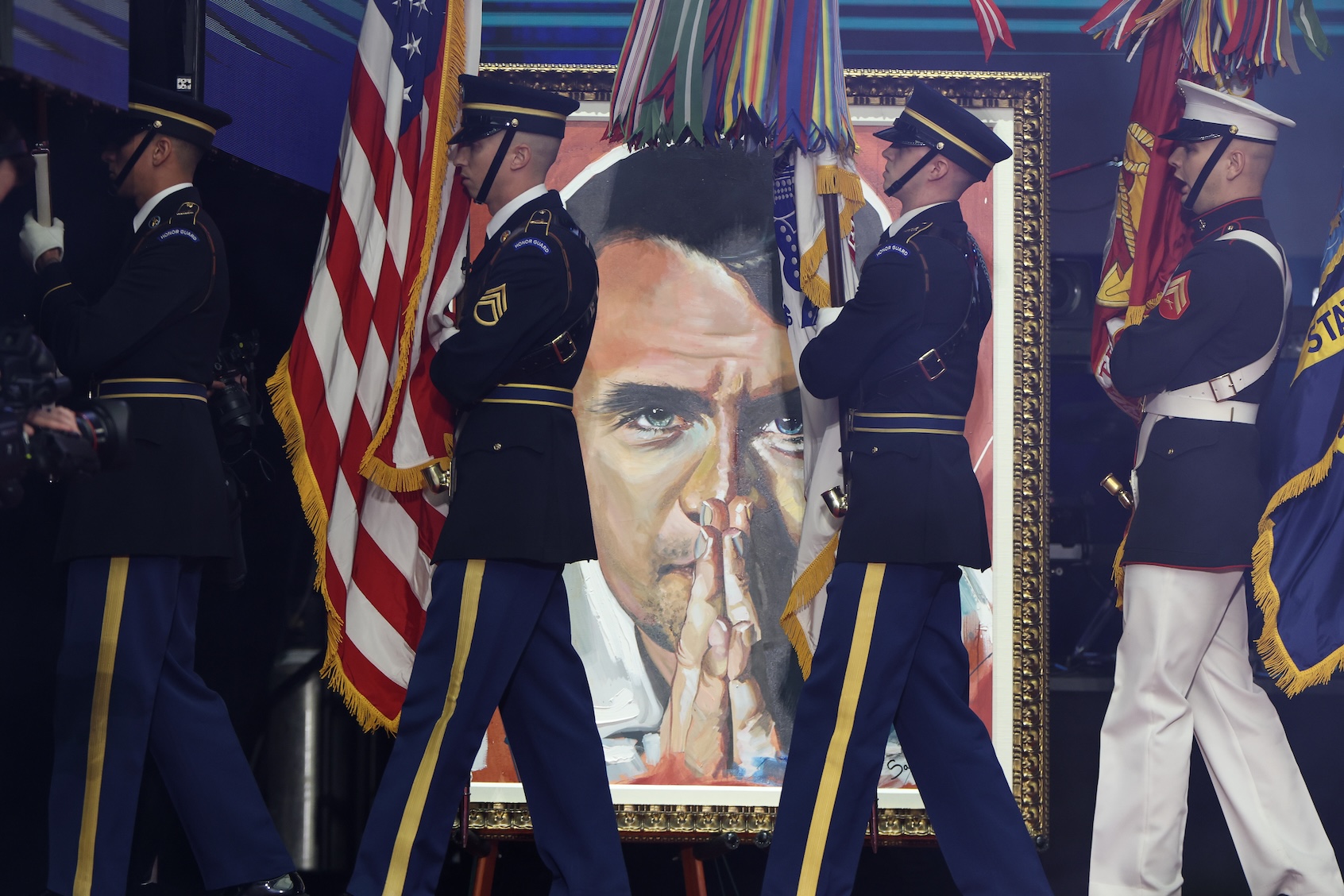
Horst Wessel was the son of a Lutheran minister, a law student enrolled at the Friedrich Wilhelm University in Berlin and something of a musician and lyricist. But he led a double life, also hanging out in bars and flophouses, and later took up with a former prostitute from the slums of Germany’s capital city.
He was also attracted to political extremism and fascinated by violence. Throughout the 1920s, Wessel drifted into several right-wing extremist organizations, and then drifted out again when he found them insufficiently militant. He eventually discovered a group more to his liking: the National Socialist German Workers’ Party, better known to history as the Nazis. He quickly rose to become a top organizer and leader in the party’s perpetual street fighting with political opponents, especially socialists and communists. He was also notable as a recruiter of aimless youths who wanted to be tough guys; for them the Nazi Storm Trooper units were the place to cast off the shackles of civilized inhibitions.
Wessel was what Hannah Arendt would have called a failed intellectual: a product of the dark underworld of modern, atomized society, whereby a person of above average intelligence, burning ambition and an essential rootlessness and absence of moral values becomes the building block of totalitarian movements – or, perhaps, the scum that floats to the top in times of social crisis. Reprehensible such people may be, but they are motivated by a kind of perverted idealism.
In 1930, Wessel was murdered by Communists, although the incident resulted from a tangled chain of events involving his unpaid rent and the landlady’s fear that his live-in girlfriend’s notoriety as a prostitute would cause trouble with the authorities.
Sordid circumstances notwithstanding, the Nazis made a highly choreographed spectacle of Wessel’s death. Although they had already sought to mythologize in the past the supposedly noble sacrifice of Nazi activists killed in street fighting, Wessel was the first to be elevated to supreme martyr status. The religious overtones were unmistakable in Joseph Goebbels’ eulogy:
A Christian [National] Socialist! A man who calls out through his deeds: “Come to me, I shall redeem you!” … A divine element works in him. making him the man he is and causing him to act in this way and no other. One man must set an example and offer himself up as a sacrifice! Well, then, I am ready!
Whatever his organizational contributions may have been, Horst Wessel was of far greater use to the Nazi leadership as a dead martyr than as a living party member. This exploitation was of course opportunistic in the extreme, but it also revealed something fundamental about totalitarian psychology. Hitler biographer Joachim Fest described Nazism as a death cult, a nihilistic movement that didn’t celebrate life, let alone try to preserve it, but instead wallowed in death and the morbid state of mind induced by solemn commemorations. They even had a “day of the dead” in imitation of Christianity, another movement fueled by apocalyptic associations and martyrology.
This fascination with death was not peculiar to the Nazi regime. Arendt described the early-20th century French hyper-nationalism of Charles Maurras (an inspiration to Steve Bannon) and Maurice Barrès as evincing “a morbid cult of the dead.” And “Viva la Muerte!” (Long live death!) was the defiant cry of José Millán-Astray y Terreros, a general in Francisco Franco’s fascist army during the Spanish Civil War.
The Nazis were not yet in power at the time of Wessel’s death, so they had no opportunity to take official retribution. For what that looks like, consider the case of Sergei Kirov. Unlike the street-fighter Wessel, Kirov was a member of the Soviet Politburo, head of the Communist Party in Leningrad and, by some accounts, the second-most powerful figure in the USSR after Joseph Stalin.
He was assassinated in 1934, ostensibly by an expelled party member with a grudge. (Given Kirov’s popularity with the party rank and file, there have been persistent rumors that Stalin, intolerant of potential rivals, was responsible for the assassin’s access to a firearm and Kirov’s inexplicable lack of bodyguards).
All the necrophilic obsequies of an ideological martyr were laid on: After his state funeral and interment in the Kremlin wall, Kirov became the namesake of countless memorials and statues, and entire cities were renamed after him.
Whether or not Stalin had a hand in his death, it was definitely convenient. This was not the work of a lone assassin, the dictator declared; a vast, shadowy opposition conspiracy was responsible. Kirov’s death sparked the Great Terror, a massive, accelerating purge of potential rivals, party officials, government functionaries, military officers and ordinary citizens that is estimated to have killed around 700,000 people by the time it ran its course in 1938. (The true number could be much higher; there are no reliable figures).
The reader can probably guess where we’re going with this. Charlie Kirk’s killing was also a convenient occasion for the ruling regime to put it to political use: How much news about Jeffrey Epstein have you encountered in the last couple of weeks?
Leave it to America, the land of free enterprise if not free speech, to devise a hybrid totalitarianism that outsources the actual implementation of repression to nongovernmental entities.
It has also unleashed an avalanche of exaggerated grief and outrage — some of it possibly self-protective, as with the maudlin effusions of Ezra Klein — and mock solemnities, including moments of silence at football games (football being the nearest thing to a tribal ritual in contemporary America). The uproar even produced this exquisitely inane headline from the New York Times: “What Charlie Kirk Could Mean for the Future of Marriage.”
And, of course, there were threats, doxing, harassment, firings — you already know all that; there is no need to recapitulate the details. But the manner of their execution tells us something striking about the regime under which we are now subjects, not citizens.
The unique factor in the current situation is that in traditional dictatorial regimes, the state directly carries out the repression of opponents. Leave it to America, the land of free enterprise if not free speech, to devise a hybrid totalitarianism that outsources the actual implementation of repression to nongovernmental entities.
Corporations are the agents actually carrying out the firings and suspensions, as in the cases of Jimmy Kimmel and Washington Post columnist Karen Attiah. It is university administrations that compose blacklists of suspect instructors and students and deliver them to the Trump regime, as typified by UC Berkeley’s disgraceful behavior. The eagerness of institutions to go the extra mile to please Trump is the key to the consolidation of the regime’s power. In the end, there are really no institutions or guardrails; there is only the moral character of the individuals concerned.
At the ground level, thousands, perhaps tens of thousands, of private citizens act as self-appointed KGB agents, poking their nose into other people’s business and publicly denouncing them to get them fired or otherwise harassed. That was, in fact, how Kirk began his illustrious career: assembling a list of college instructors and publicizing it in hopes of forcing them from their jobs.
In most cultures, from the highest social levels down to the lowest strata of prison inmates, and even among primary school pupils, the informer, the snitch, the stool pigeon, the tattletale have always been considered reprehensible. There is something about a healthy personality that feels repelled by a snoop or a snitch. Yet snoops and snitches are the pillars of the new American order.
There is something about a healthy personality that feels repelled by a snoop, a snitch, a stool pigeon, an informer. Yet snoops and snitches are the pillars of the new American order.
Josh Marshall, the editor of Talking Points Memo, observes that big corporations and the moguls who run them are highly vulnerable to blackmail by Trump’s regulatory agencies: their mergers won’t get approved, financial fraud can be alleged, broadcast licenses revoked. Hence their willingness to fire employees or deplatform entertainers who do not toe the party line. There is certainly some truth in that, but it does not tell the whole story.
Marshall’s analysis downplays the enthusiasm with which the rich side with Trump, or at least a substantial majority of them. Why shouldn’t they? He lowers their taxes, cripples IRS enforcement, hates unions, hates workers (how many employees or subcontractors has the Trump Organization cheated?), ignores antitrust law when it suits him and so on.
The recent incomprehensible behavior of the stock market in the face of persistent bad economic indicators can only mean that big investors, individual and institutional, feel so good about Trump and his policies that exuberance overrides prudence. Whatever embarrassment or humiliation any of them might feel about Trump’s demands (probably not much — the reflex of the rich is always to kiss up and kick down) is far outweighed by their belief that he is the ultimate protector of their privileges.
Want more sharp takes on politics? Sign up for our free newsletter, Standing Room Only by Amanda Marcotte, also a weekly show on YouTube or wherever you get your podcasts.
There was widespread support for fascist Italy and Nazi Germany from the American business class (including the Koch brothers’ father, Fred Koch, who built an oil refinery in Germany in the 1930s, providing the Nazis with critical high-octane aviation fuel). It was probably true that Hitler held the fate of German firms like Krupp, IG Farben and Siemens in his hands, but that did not make them any less enthusiastic in carrying out his intentions. Does anyone really think the IG Farben management was troubled by the SS’ large orders of Zyklon B?
It may be no more than excuse-making to claim that Trump “forced” our billionaire class to fire writers or entertainers — what billionaire actually likes a critic or a court jester? Committing these acts on Trump’s behalf will also have the effect of psychologically bonding them to him. They have in essence burned their bridges; their continued success will be identified with his.
The coalition between our plutocracy and the lowest reaches of internet trolls and right-wing agitators is hardly unprecedented. The alliance of German industrialists and Nazi storm troopers almost a century ago weakened and ultimately sank the Weimar Republic. The combination of billionaire rabble and basement-dwelling rabble is a time-tested method for destroying democracy, as well as rationality and common decency.



